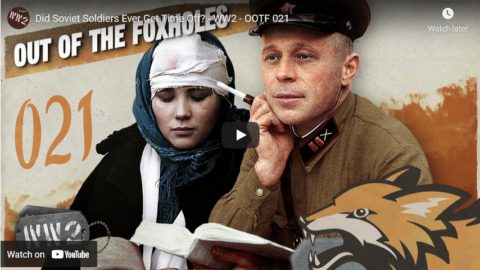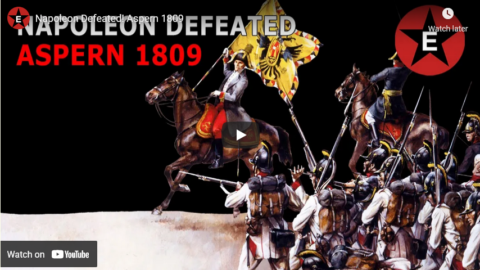World War Two
Published 18 Mar 2021Ever wonder if the Kriegsmarine saw any action in the Pacific Ocean? Or if the average Soviet soldier ever got a vacation from the most destructive conflict in the history of humanity? You can find out the answers in this episode of Out of the Foxholes!
Join us on Patreon: https://www.patreon.com/TimeGhostHistory
Or join The TimeGhost Army directly at: https://timeghost.tvFollow WW2 day by day on Instagram @ww2_day_by_day – https://www.instagram.com/ww2_day_by_day
Between 2 Wars: https://www.youtube.com/playlist?list…
Source list: http://bit.ly/WW2sourcesHosted by: Indy Neidell
Written by: Lewis Braithwaite and Dennis Stepanov
Director: Astrid Deinhard
Producers: Astrid Deinhard and Spartacus Olsson
Executive Producers: Astrid Deinhard, Indy Neidell, Spartacus Olsson, Bodo Rittenauer
Creative Producer: Maria Kyhle
Post-Production Director: Wieke Kapteijns
Research by: Dennis Stepanov and Lewis Braithwaite
Edited by: Miki Cackowski
Sound design: Marek Kamiński
Map animations: Eastory (https://www.youtube.com/c/eastory)Colorizations by:
Daniel WeissSources:
David Rumsey Map Collection, David Rumsey Map Center, Stanford Libraries
Bundesarchiv
Portrait of Robert Eyssen, courtesy of Gareth Collins
Komet schematics, courtesy of Rama https://commons.wikimedia.org/wiki/Fi…
Narodowe Archiwum Cyfrowe
State Library of QueenslandSoundtracks from the Epidemic Sound:
Phoenix Tail – “At the Front”
Johannes Bornlof – “The Inspector 4”
Howard Harper-Barnes – “Prescient”
Jo Wandrini – “Puzzle Of Complexity”Archive by Screenocean/Reuters https://www.screenocean.com.
A TimeGhost chronological documentary produced by OnLion Entertainment GmbH.
March 19, 2021
Did Soviet Soldiers Ever Get Time Off? – WW2 – OOTF 021
Napoleon Defeated! Aspern 1809
Epic History TV
Published 9 May 2019In 1809, with Napoleon and his best troops bogged down in Spain, Austria decided to try to get revenge for her humiliation at Austerlitz three years before. Archduke Charles led an invasion of France’s ally Bavaria, but Napoleon raised fresh troops and transformed the strategic situation in four days of hard fighting along the Danube. But having taken Vienna, Napoleon’s overconfidence led to a desperate battle at Aspern-Essling, resulting in his first major defeat as Emperor, and the death of his closest friend.
With thanks to HistoryMarche, check out his channel here: https://www.youtube.com/channel/UC8MX…
Get early access & vote for future topics at Patreon https://www.patreon.com/epichistorytv
Find Osprey books on the Napoleonic Wars https://ospreypublishing.com/
Recommended books on the Napoleonic Wars (as an Amazon Associate I earn from qualifying purchases):
Eggmühl 1809: Storm Over Bavaria https://geni.us/mRvuG
Aspern & Wagram 1809 https://geni.us/4wewlr
French Napoleonic Infantryman 1803-15 https://geni.us/ivLojZD
British Light Infantry & Rifle Tactics of the Napoleonic Wars https://geni.us/02ycFR4
Tactics and the Experience of Battle in the Age of Napoleon https://geni.us/mKAYz
Napoleon the Great http://geni.us/NqMWMusic from Filmstro: https://filmstro.com/?ref=7765
Get 20% off an annual license with this exclusive code:EPICHISTORYTV_ANN#EpicHistoryTV #NapoleonicWars #Napoleon
QotD: English food
For someone who remembers the old days, the food is the most startling thing about modern England. English food used to be deservedly famous for its awfulness — greasy fish and chips, gelatinous pork pies, and dishwater coffee. Now it is not only easy to do much better, but traditionally terrible English meals have even become hard to find. What happened?
Maybe the first question is how English cooking got to be so bad in the first place. A good guess is that the country’s early industrialization and urbanization was the culprit. Millions of people moved rapidly off the land and away from access to traditional ingredients. Worse, they did so at a time when the technology of urban food supply was still primitive: Victorian London already had well over a million people, but most of its food came in by horse-drawn barge. And so ordinary people, and even the middle classes, were forced into a cuisine based on canned goods (mushy peas!), preserved meats (hence those pies), and root vegetables that didn’t need refrigeration (e.g. potatoes, which explain the chips).
But why did the food stay so bad after refrigerated railroad cars and ships, frozen foods (better than canned, anyway), and eventually air-freight deliveries of fresh fish and vegetables had become available? Now we’re talking about economics — and about the limits of conventional economic theory. For the answer is surely that by the time it became possible for urban Britons to eat decently, they no longer knew the difference. The appreciation of good food is, quite literally, an acquired taste — but because your typical Englishman, circa, say, 1975, had never had a really good meal, he didn’t demand one. And because consumers didn’t demand good food, they didn’t get it. Even then there were surely some people who would have liked better, just not enough to provide a critical mass.
And then things changed. Partly this may have been the result of immigration. (Although earlier waves of immigrants simply adapted to English standards — I remember visiting one fairly expensive London Italian restaurant in 1983 that advised diners to call in advance if they wanted their pasta freshly cooked.) Growing affluence and the overseas vacations it made possible may have been more important — how can you keep them eating bangers once they’ve had foie gras? But at a certain point the process became self-reinforcing: Enough people knew what good food tasted like that stores and restaurants began providing it — and that allowed even more people to acquire civilized taste buds.
Paul Krugman, “Supply, Demand, and English Food”, https://web.mit.edu/krugman/www/mushy.html.






